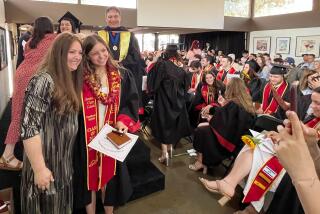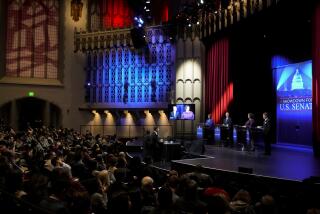Soviet Emigre to Speak for U.S. in U.S.S.R. Trip
- Share via
Jamie Goferman shakes her head in amazement when she tells people about her upcoming trip.
A Jew whose family left the Soviet Union nine years ago to escape religious persecution, 20-year-old Goferman is preparing to return to her homeland as a member of a U.S. college debate team.
“It’s unbelievable,” Goferman said softly.
More impressive to her debate coach, Don Brownlee, is that Goferman, a junior at California State University, Northridge, won a place on the prestigious national team with only four months of formal debate experience. Goferman is the first CSUN student to win a spot on a U.S. debate team.
“The best debaters are people who have a innate quality for critical reasoning,” said Brownlee, who has coached debate squads for 15 years. “Jamie’s quick success means that her parents and her earlier teachers trained her to think well.”
But Goferman had an edge. All debates in which the U.S. team will participate will be conducted in Russian. It was the language requirement that led Brownlee to ask Goferman if she was interested in applying for the team.
Because proficiency in Russian is required, only 20 college students applied for the team and only seven spoke Russian well enough to be finalists, said Don Shield, director of education services for the Speech Communications Assn., the group sponsoring the team.
However, of the three who won spots on the team, Goferman is the only native Russian speaker. One team member, a student at Harvard University, lived in Russia for several years while his father was the Moscow bureau chief for the Washington Post. The other member, also a student at Harvard, is majoring in comparative literature and Russian. She never has been to the Soviet Union, Shield said.
How did a quiet Soviet emigrant who hardly spoke above a whisper and sometimes stared into space as she tried to find the right word turn into a scrappy debater who shows opponents no mercy?
“My friends describe me as kind of quiet, but when I start to debate, my opponents better watch out,” she said. “I’ve learned how to be courageous.”
Goferman, now a legal alien, was 11 years old when she, her younger sister and her parents left Odessa, a southern Ukrainian city on the Black Sea. After traveling through Czechoslovakia, Austria and Italy, the family headed to Los Angeles to live near Goferman’s uncle.
Goferman will be the first member of her family to return to the Soviet Union. She said her mother, a mechanical engineer, and her father, a cab driver, have started to write to relatives about their daughter’s impending return.
Goferman holds little hope that the debate team will travel to her hometown, or that authorities will allow her to leave the team for a quick visit to Odessa.
“My relatives will know that I’m in Russia. I’ll leave the option of getting in touch with me up to them,” she said.
The U.S. team will debate Soviet university students during a 2 1/2-week tour that begins in April in Moscow.
At each stop across the Soviet Union, the squad will debate local students on the proper relationship between government and the media. Each side must defend the viewpoint of its government, explained Brownlee.
“I guess that means the Russians will take the position that the media works best when it is highly regulated and the American team will defend a free and unregulated press,” he said.
Brownlee first met Goferman in September when she enrolled in his honors speech class. Although a quiet and somewhat shy student, she completed a class project by participating in a formal debate instead of writing a research paper.
“Most students perceive debaters as verbose, verbally aggressive people,” Brownlee said. “They don’t know that debaters must conduct extensive research and have thorough understanding of their subject before the debate starts. A lot of them are surprised to find out that there is so much research work involved in preparation for a debate.”
Goferman said participating in the classroom debate was a turning point for her because it stimulated her interest in school.
Too Much of an Accent
She began her U.S. education at Bancroft Junior High in Los Angeles, where teachers said Goferman was a good, but not memorable student. At the time, Goferman said her career goal was to become an actress. But that dream seemed unachievable after a drama teacher rejected her for the musical “West Side Story” because, she was told, she spoke English with too much of an accent.
“After that, I stopped speaking Russian and would only speak English,” she remembered somewhat bitterly.
Since her involvement with the debate team, Goferman said, becoming an actress has “become a distant dream.” She said, “If law is like debating, then I think I want to try law school.”
After leaving Bancroft, Goferman attended Hollywood High School until her family moved to the San Fernando Valley. She transferred to Granada Hills High, where she remembers her classmates’ major concerns as cars, clothes and being part of the right cliques.
At CSUN, Goferman decided to major in humanities, with a special emphasis in 19th-Century French and Russian literature. She said she felt like just another face in a crowd of 29,000 CSUN students until the debate in Brownlee’s class.
‘Terribly Terrifying’
“I discovered there’s something about debating in front of a group of people that’s terribly terrifying, but I knew I wanted to do it and I knew I would be good at it.”
Goferman’s team did well in the classroom debate and, with a successful match under her belt, she joined the CSUN debate club and started entering tournaments.
In October, Goferman and her partner almost won the novice-division title in a San Diego tournament. In November, she won the novice division at a competition in Sacramento. The victory moved her out of the novice division and into the junior division.
“Usually, it takes a debater a year to move from one category to another. Jamie did it in just a few months,” said Brownlee.
Success in debate, Goferman said, convinced her that her English was excellent and whatever slight accent she had made no difference. After she came to that realization, she said she was ready to rediscover her native language.
At the urging of her mother, she read Tolstoy’s novel “Anna Karenina” in Russian. She said she was amazed at the beauty of the language and promised herself that she would read all her favorite 19th-Century Russian authors in Russian.
Russian Language Course
Next, Goferman enrolled in a CSUN Russian language course, “just to hear somebody speak Russian regularly.”
And after she was chosen for the U.S. debate squad, Goferman started speaking Russian to her parents.
“My dad was really glad to hear me speaking Russian again,” she said.
Goferman said she has avidly followed news reports about Soviet leader Mikhail S. Gorbachev’s policies of glasnost and perestrokia , which many believe signal the begining of a more open Soviet society.
“I’ve heard about all these changes that have taken place, but I’d like to see for myself,” she said.
But more than that, Goferman wants to sniff the lilacs in her native land.
“I remember lilac bushes and I remember the smell,” she said. “You can’t find lilacs in a warm climate like this one. I want to find lilacs.”
More to Read
Sign up for Essential California
The most important California stories and recommendations in your inbox every morning.
You may occasionally receive promotional content from the Los Angeles Times.










